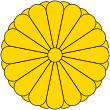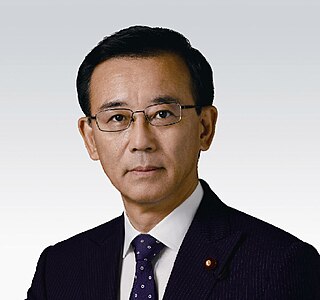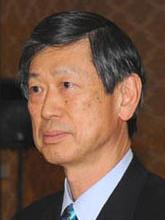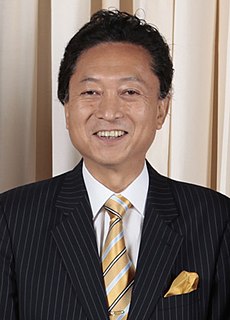
 |
|---|
| This article is part of a series on the politics and government of Japan |
A leadership election was held in the Liberal Democratic Party of Japan on 22 September 2008 after the incumbent party leader and Prime Minister of Japan Yasuo Fukuda announced that he would resign on 1 September 2008, only 11 months after taking office on 25 September 2007 following a leadership election on 23 September 2007. Taro Aso, who had lost to Fukuda in the 2007 leadership election, was widely seen as the frontrunner to replace him, [1] and announced on 2 September 2008 he was ready to take over as party leader. [2] Aso won the leadership election against four opponents, receiving 67% of the vote. [3]

The Liberal Democratic Party of Japan, frequently abbreviated to LDP or Jimintō (自民党), is a conservative political party in Japan.

Japan is an island country in East Asia. Located in the Pacific Ocean, it lies off the eastern coast of the Asian continent and stretches from the Sea of Okhotsk in the north to the East China Sea and the Philippine Sea in the south.

The Prime Minister of Japan is the head of government of Japan. The Prime Minister is appointed by the Emperor of Japan after being designated by the National Diet and must enjoy the confidence of the House of Representatives to remain in office. He is the chairman of the Cabinet and appoints and dismisses the other Ministers of State. The literal translation of the Japanese name for the office is Minister for the Comprehensive Administration of the Cabinet.
Contents
It was reported that Yuriko Koike, a former defence chief who is seen as close to former Prime Minister Junichiro Koizumi, might stand against Aso; in that case, the LDP leadership election would be a decision between the conservative traditionalist Aso and the unorthodox reformist Koike. [4] Economics minister Kaoru Yosano and former transport minister Nobuteru Ishihara, the son of the controversial right-wing nationalist governor of Tokyo Shintarō Ishihara, also indicated they might run, [5] as did former defence minister Shigeru Ishiba, senior vice foreign minister Ichita Yamamoto and former science and economic minister Yasufumi Tanahashi. [6] Campaigning began on 10 September 2008; [7] a total of 528 people are eligible to vote (387 Diet members and 141 prefectural representatives). [8]

Yuriko Koike is a Japanese politician who currently serves as the governor of Tokyo. She was a member of the House of Representatives of Japan from 1993 to 2016, and was previously the Minister of Defense in the cabinet of Prime Minister Shinzō Abe, but resigned in August 2007 after only 54 days in office. On 31 July 2016, Koike was elected Governor of Tokyo, the city's first female governor.

Junichiro Koizumi is a Japanese politician, who was the 56th Prime Minister of Japan from 2001 to 2006. He retired from politics when his term in parliament ended in 2009, and is the sixth longest serving PM in Japanese history.

Kaoru Yosano was a Japanese politician. He was a member of the Liberal Democratic Party (LDP), the Sunrise Party of Japan and former member of the House of Representatives, serving his ninth term in the Lower House representing Tokyo's first electoral district until his defeat in the Japanese general election, 2009. Yosano was Chief Cabinet Secretary to Prime Minister Shinzō Abe from August 2007 to September 2007 and was Minister of Economic and Fiscal Policy in Tarō Asō's administration from February to September 2009.
To stand in the election, candidates had to gather twenty signatures from electors. Aso formally declared his candidacy on 5 September 2008, [9] and Koike on 8 September 2008. [10] Yosano, Ishiba and Ishihara also filed to run, while Yamamoto and Tanahashi decided not to stand for the leadership. [11] [12] Koizumi announced he would support and vote for Koike. [13]
By election day, Aso had secured the votes of at least 60% of the electors and was assumed to win the election in the first round. [14]
Aso went on to win the election by a landslide 351 votes. Yosano got 66 votes, Koike 46, Ishihara 37 and Ishiba 25. [3] [15] Aso was sworn in as Prime Minister on 24 September 2008. Some speculated that a general election would be called on 3 October for 26 October 2008 following the leadership election, but this failed to materialise. [16] [17] [18] [19]

The 49th general election of members of the House of Representatives is scheduled on or before 22 October 2021, as required by the Constitution of Japan. Voting will take place in all Representatives constituencies of Japan including proportional blocks, in order to appoint Members of Diet to seats in the House of Representatives, the lower house of the National Diet of Japan. As the cabinet has to resign after a general House of Representatives election in the first post-election Diet session, the lower house election will also lead to a new designation election of the Prime Minister in the Diet, and the appointment of a new cabinet.













